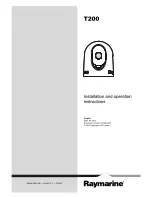
7.5.6
Resistance variations
Overheating can have many origins. Some common reasons are described below.
Low contact pressure can occur when mounting a joint, or through wear of the mate-
rial, for example, decreasing spring tension, worn threads in nuts and bolts, even too
much force applied at mounting. With increasing loads and temperatures, the yield
point of the material is exceeded and the tension weakens.
The image to the left below shows a bad contact due to a loose bolt. Since the bad
contact is of very limited dimensions, it causes overheating only in a very small spot
from which the heat is spread evenly along the connecting cable. Note the lower
emissivity of the screw itself, which makes it look slightly colder than the insulated—and
thereby it has a high emissivity—cable insulation.
The image to the right shows another overheating situation, this time again due to a
loose connection. It is an outdoor connection, hence it is exposed to the cooling effect
of the wind and it is likely that the overheating would have shown a higher temperature,
if mounted indoors.
10714203;a3
Figure 7.16 LEFT: An infrared image showing bad contact due to a loose bolt; RIGHT: A loose outdoor
connection, exposed to the wind cooling effect.
7.5.7
Overheating in one part as a result of a fault in another
Sometimes, overheating can appear in a component although that component is OK.
The reason is that two conductors share the load. One of the conductors has an in-
creased resistance, but the other is OK. Thus, the faulty component carries a lower
load, whereas the fresh one has to take a higher load, which may be too high and
which causes the increased temperature. See the image.
7
Publ. No. 1558146 Rev. a156 – ENGLISH (EN) – February 28, 2006
33
7 – Introduction to thermographic inspections of electrical installations



































